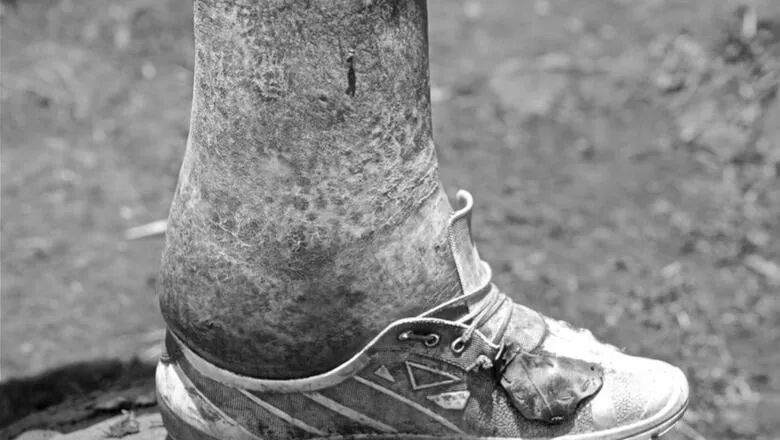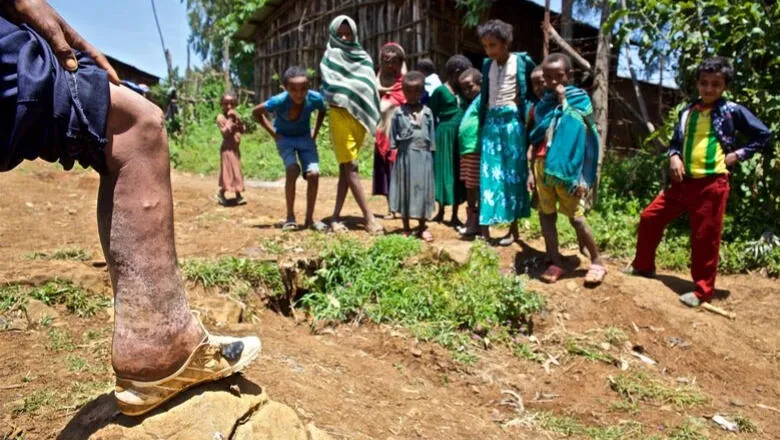Podoconiosis has been recognised by the World Health Organisation as a Neglected Tropical Disease with good reason. The populations affected are poor and those affected do not have the attention nor the resources they deserve.
Dr Alex Kumar, School of Population Health and Environmental Sciences
19 September 2019
Podoconiosis – Stepping out of Neglect
Podoconiosis is a debilitating, non-transmissible and preventable neglected tropical disease (NTD) that affects individuals who are exposed over many years to irritant minerals in soil provoking an abnormal inflammatory reaction.

In an article published this week in the Lancet, a researcher from King’s working in collaboration with researchers from Brighton and Sussex Medical School and Ethiopia, is putting podoconiosis in the spotlight.
Podoconiosis is a debilitating, non-transmissible and preventable neglected tropical disease (NTD) that affects individuals who are exposed over many years to irritant minerals in soil provoking an abnormal inflammatory reaction. Long-term exposure through walking, ploughing or going barefoot on specific clay soils appears to trigger changes within the lymph system in the feet and legs leading to swelling of the lower legs and episodes of extreme pain which worsen with prolonged exposure.
Co-author Dr Kebede Deribe from the Centre for Global Health Research at Brighton and Sussex Medical School said: “Podoconiosis is a widespread and important public health problem in Ethiopia. Nationwide mapping estimated that there are 1.5 million people living with podoconiosis in Ethiopia alone with more than 35 million people at risk. Podoconiosis has been documented in 32 countries worldwide with the highest burden concentrated in Africa.”
It affects individuals and communities who bear social stigma, face discrimination and suffer resulting economic loss due to the disease. Podoconiosis is preventable through consistent wearing of shoes from early childhood, good foot hygiene and covering floors. Health education is vital, so patients understand the causes of the disease and stigma is reduced. However, awareness of ‘mossy foot’ is low, even among health professionals. The team argues that shoes, as part of clothing, should be considered as a human right.

"It is preventable and we can actually eliminate it. Increasing availability and access to correctly sized shoes in at risk populations in all the countries affected is vital. It’s a complex problem. However, we fail as clinicians and health professionals to even know about the disease, let alone recognise and diagnose to treat this disease. Politicians fail patients by not prioritising this disease. Communities fail their community members affected by stigmatising this disease. And those who fund research need to devote more research resources to this disease. There is no diagnostic test available and while good foot hygiene is also central to management, there's no treatment for end stage disease. Education is key," said lead author Dr Alex Kumar, King’s alumnus and current NIHR academic clinical fellow in primary care from the School of Population Health and Environmental Sciences.
Dr Kumar, as the world’s first medical doctor and photographer specialised in global health photography, has captured images of diseases all over the world. “I hope through my work, I can change the way health professionals, patients, their families and communities perceive diseases and in turn change outcomes, for the better. It sounds basic, but basic interventions save lives,” he said.
As part of the Lancet article and in order to raise more awareness of the disease, Dr Kumar is currently exhibiting 25 images at the joint 2019 NTD NGO Network (NNN) Conference and 11th European Congress on Tropical Health Medicine and International Health (ECTMIH) which runs until 20 September in Liverpool. All images were taken by him on a visit to northern Ethiopia.

The Podoconiosis – Stepping out of Neglect article and exhibition aims to change the way we understand and perceive the disease. These powerful images tell the stories of patients, in their own words, having access to health promotion and treatment at a remote clinic in the Amhara region in Ethiopia.
“They are the lucky ones,” said Dr Kumar. “Through a network of health and community workers, the causes and prevention of the disease are explained to them and foot hygiene is practised. Soap is an important component of foot hygiene, but mild, low-alkalinity soaps can be difficult to find in remote rural settings. Rinsing the lather off uses precious water, however, a recent trial demonstrated excellent results using glycerol and a significantly reduced volume of water."
Professor Gail Davey, Professor of Global Health epidemiology at Centre for Global Health Research at Brighton and Sussex Medical School, said: “We were delighted to launch the exhibition at the Neglected Tropical Disease NGO Network (NNN) synchronously with the publication. The article and the photos draw much-needed attention to podoconiosis and the work of Footwork, the global grouping whose vision is a world free of podoconiosis in our lifetimes.”
We can end podoconiosis in our lifetime. Giving shoes to someone is one thing, it’s just the first step and it’s not enough.
Dr Alex Kumar
"We have to change health provider awareness, alongside the patients’ and communities’ understanding of this disease. Patients have to be trained to act as advocates and experts within their communities, taking home the truth and positive messages, to change the way we see the disease."
This research was funded by the National Institute for Health Research (NIHR) Global Health Research Unit on NTDs at BSMS, using UK aid from the UK Government to support global health research.
